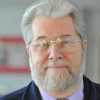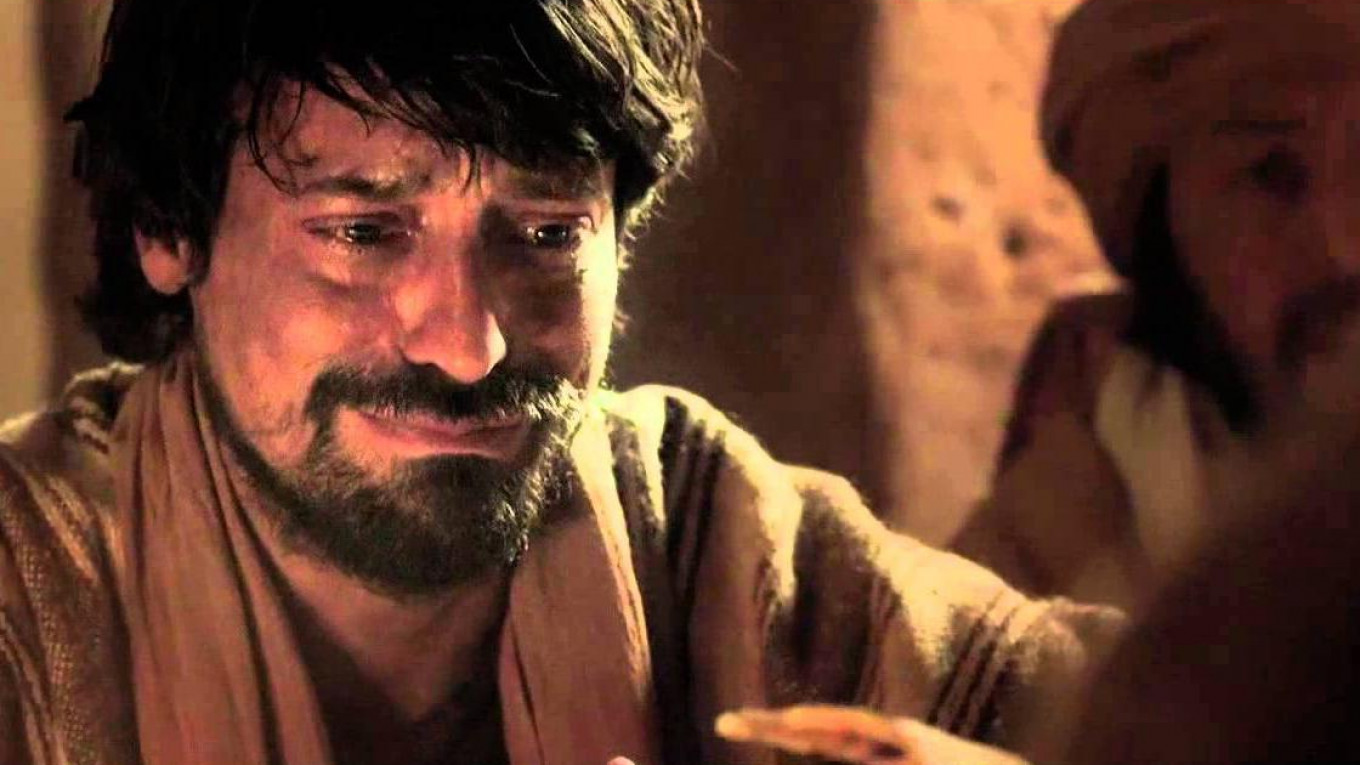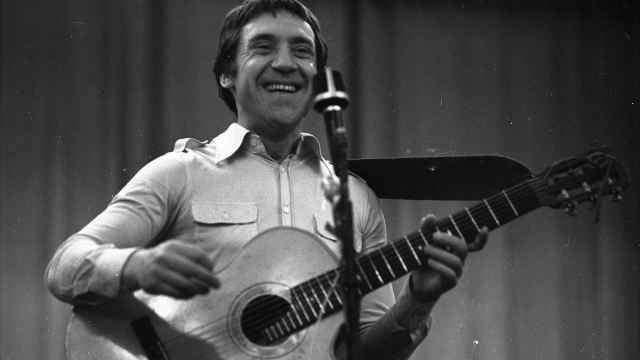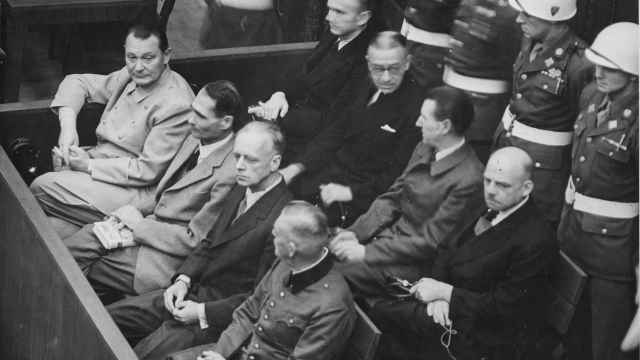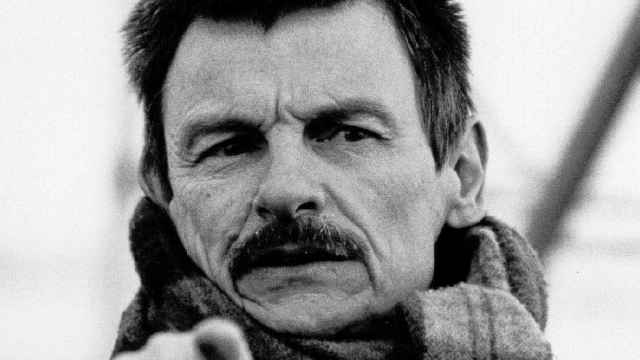It’s Take It on Faith Week on Moscow television, as the small screen offers viewers a broad assortment of commendable Bible-related features during this year’s commonly-shared Holy Week. Here’s the faith-based where and when:
MONDAY. With Eastern and Western believers celebrating Easter on the same Sunday this year, local Christians of all denominations can watch the elaborate 10-part U.S.-UK production of “The Bible” (2012) in the same holiday context this week – from Monday’s Adam and Eve/Moses and Pharaoh (parts one and two) through Pilate and Jesus/Apostle Diaspora (parts nine and 10) on the evening of Good Friday.
This History Channel/20th Century Fox mini-series is an impressive production in many respects, and its three Primetime Emmy nominations and Key Award win (for Best Audio-Visual Technique) are a good gauge of what viewers get: Cecil B. DeMille in spirit, but tech-ed up and toned down for the new millennium.
And while no film about religion will please everyone, viewers East and West have reached a remarkable consensus on this one: right along with their calendars coinciding, English- and Russian-speaking audiences have awarded the series almost identical high ratings: 7.50/10 on IMDB and 7.33/10 on KinoPoisk respectively. True, one stern critic on the latter gave “The Bible” an apocalyptic “6.66/10”; but another Russian viewer was clearly closer to the general view, calling the series “worthwhile watching for all young believers – and not just them.”
The Bible / Библия. Kultura, Monday-Friday at 11:15 and 12:00 midnight
TUESDAY brings another televised approach to the origins of faith with part one of the six-part BBC documentary “A History of Christianity” (2012). Oxford don Diarmaid McCulloch – author of the award-winning “The History of Christianity: The First Three Thousand Years” (2009) – takes viewers to points of interest in the early development and spread of the faith, effectively incorporating the strengths of the visual medium while keeping his core-history exposition crisp and to the point.
McCulloch’s narrative is at once professional and sympathetic: This is a professor speaking, yes, but also a self-described “candid friend” of Christianity, a movement whose flaws he does not elide – and which he also believes “has a long history ahead of it.”
At the end of the day, this engaging mini-series is probably as close as television can come to a warts-and-all history of the Christian record for the broad viewing public – and its high ratings from both English- and Russian-speaking audiences (7.6/10 and 7.1/10 on IMDb and KinoPoisk respectively) show that this good-faith effort has been appreciated.
A History of Christianity / История христианства. Viasat History, Tuesday at 10:00 p.m. (part 1)
On WEDNESDAY Kultura offers a new documentary on the greatest iconographer you’ve never heard of. Natalya Sergeyeva’s “Leonid Uspensky: A Story of Transformation and Love” (2017) recounts yet another only-in-Russia life narrative that fiction writers would shy away from as unbelievable.
Born into a noble family in the Voronezh region, Uspensky joined the Red Cavalry in the Civil War, was captured but pardoned by the Whites, left Crimea for Constantinople with the Wrangel evacuation, then worked in Bulgarian coal mines for six years before making his way to Paris, where a newly-discovered talent for art led him to icon painting.
After study under the famous Monk Grigory (Krug), Uspensky took part in painting the interior of Paris’s Orthodox Eglise cathédrale des Trois-Saints-Docteurs (Xрам Трехсвятительского подворья) and went on to become a prolific and widely known professor of iconography at the Institut Orthodoxe Français de Paris Saint-Denys (Богословский Институт святого Дионисия) – and a scholar-artist of sufficient authority in his field to be invited to lecture at the Moscow Theological Academy, which he did in 1969.
Would that more of Russia’s 20th century diaspora had had stories that ended as fulfillingly as that of Leonid Uspensky (1902-1987). What better one to watch, in any case, during the week before Easter?
Leonid Uspensky: A Story of Transformation and Love / Леонид Успенский. История преображения и любви. Kultura, Wednesday at 10:55 p.m.
On THURSDAY a new documentary by Sergei Khovenko addresses a centennial holiday question that few new-millennium Russians are likely to have pondered: what became of Easter when the Russian church was suddenly separated from the state? “Red Easter” examines the year spanning the Easters of 1917 and 1918, a complex and often chaotic period in Russian society: following the “bourgeois democratic” revolution of February, the first post-tsarist Easter was predictably “colored by a new symbolism”; but no one had any idea what would or should happen next – Russian Orthodoxy had never existed separate from the Russian autocracy that was its partner and guarantor, so anything could happen…
Khovenko has assembled some good people to reflect on what did happen and what might have during this crucial interregnum for the church. Tune in and see how archpriest Vladimir Vigilyansky, theologian Vasily Morov, church historian Nikolai Lisovoi and theology professor Aleksi Svetozarsky put the two promising and trying Easters of a century ago into a context that today’s believers can appreciate.
Red Easter / Красная Пасха. Kultura, Thursday at 10:55 p.m.
FRIDAY offers viewers a new look at another spiritual path, this one a personal rather than institutional model – indeed, probably the most famous model of personally-forged belief in Russian history.
Alexander Kazakevich’s “The Monastic Elders and Russian Literature: Lev Tolstoy” (2017) takes on the question of why the great writer and towering public figure, long since deemed a heretic by the Orthodox Church for his resistance to clerical institutions, headed off from Yasnaya Polyana on his final journey in life not to seek solitude, but rather for the company of the elders of Optima Pustyn monastery in Kaluga – whose counsel he has taken twice before.
The film is an attempt to answer the striking riddles of Tolstoy’s path: Did the great man spend the second half his life moving away from the God of his people’s church, or was he in fact moving toward that God, albeit in his own way? And did a meeting finally take place?
The Monastic Elders and Russian Literature: Lev Tolstoy / Старцы и русская литература. Лев Толстой. Kultura, Friday at 3:10 p.m.
Mark H. Teeter is the editor of Moscow TV Tonite on Facebook.
A Message from The Moscow Times:
Dear readers,
We are facing unprecedented challenges. Russia's Prosecutor General's Office has designated The Moscow Times as an "undesirable" organization, criminalizing our work and putting our staff at risk of prosecution. This follows our earlier unjust labeling as a "foreign agent."
These actions are direct attempts to silence independent journalism in Russia. The authorities claim our work "discredits the decisions of the Russian leadership." We see things differently: we strive to provide accurate, unbiased reporting on Russia.
We, the journalists of The Moscow Times, refuse to be silenced. But to continue our work, we need your help.
Your support, no matter how small, makes a world of difference. If you can, please support us monthly starting from just $2. It's quick to set up, and every contribution makes a significant impact.
By supporting The Moscow Times, you're defending open, independent journalism in the face of repression. Thank you for standing with us.
Remind me later.

